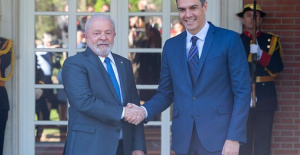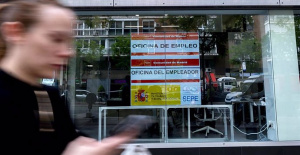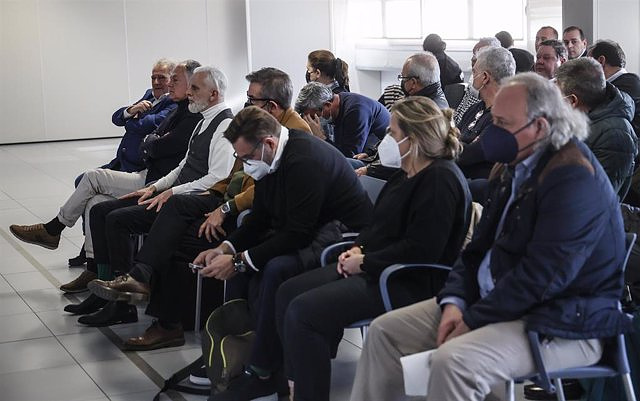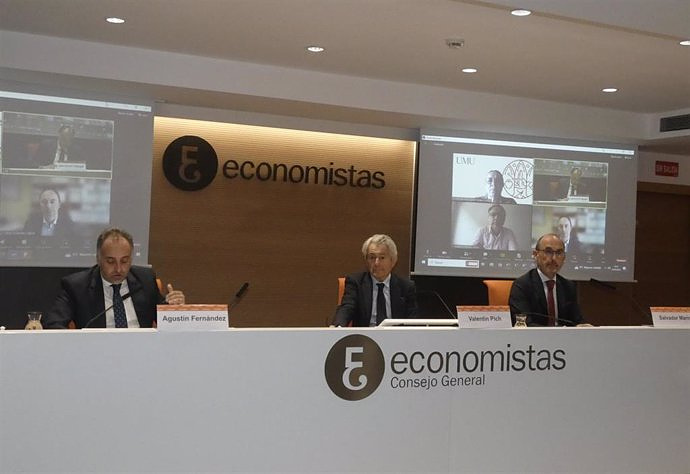Caturla's declaration, scheduled for today, is postponed due to a problem with documentation
VALENCIA, 27 Jan. (EUROPE PRESS) -
María Escrihuela, who was director of Training and People and Knowledge Management of the extinct public company Imelsa, has denied irregularities in the entity and has pointed out that it was the former manager Marcos Benavent who indicated who to hire, "but within a relationship normal work", he clarified. Likewise, she has denied that she knew of the existence of people who did not go to work, known as 'zombies'.
Escrihuela has ruled in these terms during her statement, as a defendant, in the trial that is ongoing against her and 24 other people in the Valencia Court for parts B and F of the Imelsa case. The former regional secretary of Education and former CEO of Ciegsa Máximo Caturla was scheduled to begin declaring this Friday, but his testimony had to be postponed due to a problem with documentation to which there was no access.
The former senior manager, who faces six years in prison -as provisionally claimed by the prosecutor's office-, explained that she started working at Imelsa in March 2008 after being proposed by Benavent, a self-described 'money junkie'.
The defendant, a graduate in Psychology, has indicated that the reason she joined Imelsa was to promote the motivation and performance of the employee: "A change in culture was intended and I was a specialist," she stated. Thus, in the company I was in charge of people management and there was another legal-labor department.
The hiring, she has said, depended on her "in part" and also on the legal department, but not the salaries. She has commented that she did not intervene in the selection process and that it was Benavent or the Brigades staff who told her which people had to be hired.
"The hiring was not imposed on me, but a person hierarchically superior to me told me that someone had to be hired. It was a normal labor order that is had in companies, a communication," he stated, and questioned if it could be oppose a contract, he replied: "I never saw anything that made me think that I had to oppose something".
The defendant has also indicated that those hired in Imelsa could work in other Provincial Council buildings "doing work, for example, supporting CEOs, the press or the Department of Tourism."
On the existence of advisers and their legality, Escrihuela has indicated that he consulted with the legal director about this figure and he replied that "no problem", that it existed since 1998 and that there was no legal problem: "They told me to hire a person with an advisory contract and the company's legal representative did not give it more importance, he did not see a problem. So for me there was no problem either ".
The defendant, asked about the 'zombies', has assured that she did not detect the existence of workers who did not work and no one commented on it either. "If so, I would have immediately left my job," she added. "No adviser came to me to tell me that they did not give him a job," she added.
To control the attendance of employees, she explained that she put into operation an electronic clocking system but that not everyone could access, but only those who had a computer.
In relation to productivity and allowances, which the defendant also enjoyed in Imelsa, she has stated that she wanted to encourage motivation and has indicated that her productivity was approved by the manager: "I always received maximum productivity because I met objectives and more than enough ", he pointed out.
These two pieces, B and F, add up to 25 defendants, among them, the former president of the Diputación and of the PP of the province of Valencia Alfonso Rus, the former sub-delegate of the Government in Valencia and former deputy Rafael Rubio (PSPV), Caturla and the former deputy of the PP Salvador Enguix.
This is the second trial of the Imelsa macro-cause, since the first one was tried in May, the one related to Thematica, with the 'money junkie' as the main defendant, who has been sentenced to seven years and 10 months in prison .
In the pieces that are being judged now, B and F, allegedly irregular hiring has been investigated in the public companies Imelsa and Ciegsa, Rus faces a sentence of 12 years in prison and Rubio --also investigated in the case known as Azud-- to oros six, as can be seen from the provisional qualification of the public prosecutor's office.
The Prosecutor's Office attributes to Rus the crimes of belonging to a criminal organization, a continuous crime of embezzlement of public funds, administrative prevarication and falsification of an official document committed by a public official. Likewise, Rubio is accused of a continued crime of embezzlement of public funds, forgery in an official document and a continued crime of administrative prevarication.
For the former regional secretary of Education Máximo Caturla and the former chief of staff of Rus, Emilio Llopis, he claims the same penalty as for the former president of the Provincial Council for identical crimes, in addition to a fine and disqualification.

 Exploring Cardano: Inner Workings and Advantages of this Cryptocurrency
Exploring Cardano: Inner Workings and Advantages of this Cryptocurrency Seville.- Economy.- Innova.- STSA inaugurates its new painting and sealing hangar in San Pablo, for 18 million
Seville.- Economy.- Innova.- STSA inaugurates its new painting and sealing hangar in San Pablo, for 18 million Innova.- More than 300 volunteers join the Andalucía Compromiso Digital network in one month to facilitate access to ICT
Innova.- More than 300 volunteers join the Andalucía Compromiso Digital network in one month to facilitate access to ICT Innova.-AMP.- Ayesa acquires 51% of Sadiel, which will create new technological engineering products and expand markets
Innova.-AMP.- Ayesa acquires 51% of Sadiel, which will create new technological engineering products and expand markets White House debunks Hamas's proposal for a five-year truce in exchange for a Palestinian state
White House debunks Hamas's proposal for a five-year truce in exchange for a Palestinian state Lula speaks with Sánchez to show him his "solidarity" and highlight his "role and leadership"
Lula speaks with Sánchez to show him his "solidarity" and highlight his "role and leadership" Unemployment rises by 117,000 people until March and 139,700 jobs are destroyed, its biggest drop since 2020
Unemployment rises by 117,000 people until March and 139,700 jobs are destroyed, its biggest drop since 2020 STATEMENT: Sottopiatto presents the most exclusive kitchenware to give as a gift on Mother's Day
STATEMENT: Sottopiatto presents the most exclusive kitchenware to give as a gift on Mother's Day How Blockchain in being used to shape the future
How Blockchain in being used to shape the future Not just BTC and ETH: Here Are Some More Interesting Coins Worth Focusing on
Not just BTC and ETH: Here Are Some More Interesting Coins Worth Focusing on Retrópolis brings the golden age of video games and computing to the UPV
Retrópolis brings the golden age of video games and computing to the UPV Looking for video games that value the neighborhoods of Valencia
Looking for video games that value the neighborhoods of Valencia UPV researchers improve the efficiency of air conditioning systems using a geothermal heat pump
UPV researchers improve the efficiency of air conditioning systems using a geothermal heat pump València is committed to citiverse and smart tourism to be "the reference technological hub of the Mediterranean"
València is committed to citiverse and smart tourism to be "the reference technological hub of the Mediterranean" A million people demonstrate in France against Macron's pension reform
A million people demonstrate in France against Macron's pension reform Russia launches several missiles against "critical infrastructure" in the city of Zaporizhia
Russia launches several missiles against "critical infrastructure" in the city of Zaporizhia A "procession" remembers the dead of the Calabria shipwreck as bodies continue to wash up on the shore
A "procession" remembers the dead of the Calabria shipwreck as bodies continue to wash up on the shore Prison sentences handed down for three prominent Hong Kong pro-democracy activists
Prison sentences handed down for three prominent Hong Kong pro-democracy activists ETH continues to leave trading platforms, Ethereum balance on exchanges lowest in 3 years
ETH continues to leave trading platforms, Ethereum balance on exchanges lowest in 3 years Investors invest $450 million in Consensys, Ethereum incubator now valued at $7 billion
Investors invest $450 million in Consensys, Ethereum incubator now valued at $7 billion Alchemy Integrates Ethereum L2 Product Starknet to Enhance Web3 Scalability at a Price 100x Lower Than L1 Fees
Alchemy Integrates Ethereum L2 Product Starknet to Enhance Web3 Scalability at a Price 100x Lower Than L1 Fees Mining Report: Bitcoin's Electricity Consumption Declines by 25% in Q1 2022
Mining Report: Bitcoin's Electricity Consumption Declines by 25% in Q1 2022 Oil-to-Bitcoin Mining Firm Crusoe Energy Systems Raised $505 Million
Oil-to-Bitcoin Mining Firm Crusoe Energy Systems Raised $505 Million Microbt reveals the latest Bitcoin mining rigs -- Machines produce up to 126 TH/s with custom 5nm chip design
Microbt reveals the latest Bitcoin mining rigs -- Machines produce up to 126 TH/s with custom 5nm chip design Bitcoin's Mining Difficulty Hits a Lifetime High, With More Than 90% of BTC Supply Issued
Bitcoin's Mining Difficulty Hits a Lifetime High, With More Than 90% of BTC Supply Issued The Biggest Movers are Near, EOS, and RUNE during Friday's Selloff
The Biggest Movers are Near, EOS, and RUNE during Friday's Selloff Global Markets Spooked by a Hawkish Fed and Covid, Stocks and Crypto Gain After Musk Buys Twitter
Global Markets Spooked by a Hawkish Fed and Covid, Stocks and Crypto Gain After Musk Buys Twitter Bitso to offset carbon emissions from the Trading Platform's ERC20, ETH, and BTC Transactions
Bitso to offset carbon emissions from the Trading Platform's ERC20, ETH, and BTC Transactions Draftkings Announces 2022 College Hoops NFT Selection for March Madness
Draftkings Announces 2022 College Hoops NFT Selection for March Madness























